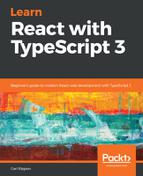Exporting code from a module allows it to be used by other modules. In order to export from a module, we use the export keyword. We can specify that an item is exported using export directly before its definition. Exports can be applied to interfaces, type aliases, classes, functions, constants, and so on.
Let's start to adjust our example code from the previous section to operate in modules rather than the global scope:
- Firstly, let's export the Product interface:
export interface Product {
name: string;
unitPrice: number;
}
- After we make this change, the compiler will complain about the reference to the Product interface in the OrderDetail class:

This is because Product is no longer in the global scope but OrderDetail still is. We'll resolve this in the next section, but let's look at alternative ways we can export the Product interface first.
- We can use an export statement beneath the item declarations. We use the export keyword followed by a comma-delimited list of item names to export in curly braces:
interface Product {
name: string;
unitPrice: number;
}
export { Product }
- With this approach, we can also rename exported items using the as keyword:
interface Product {
name: string;
unitPrice: number;
}
export { Product as Stock }
